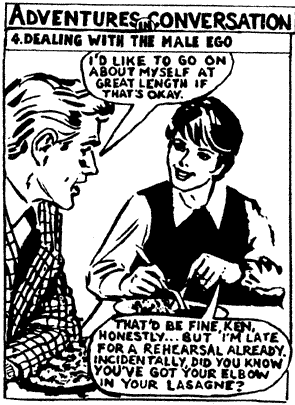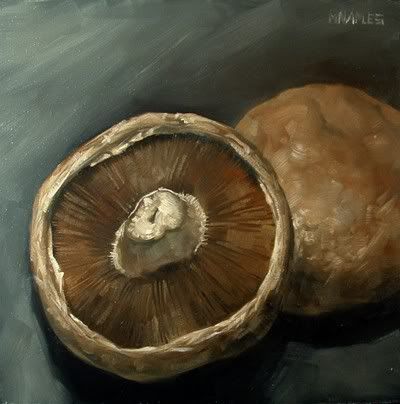
The hissing of the cooking Portobella mushrooms merges with the hissing of the light rain. Through the window I can also hear the brave sound of morning birds singing.
Eileen arrived safely home last night from her conference. I had some food in the fridge for her to heat up. This morning I am cooking mushrooms because the portobella mushroom looked like it was quickly getting a bit old.
Composing didn’t go as well yesterday, but I did get the bills all paid, kitchen cleaned and a good deal of piano practice in.

I also waded into a conversation on Facebook.

Two people were talking about the relative merits of Mendelssohn and Bach. Mendelssohn of course got the short stick. I can’t figure out why academics find him so wanting. I have to suspect that it’s sort of the party line that begins with his own self-criticisms and runs like a thread right up until recently.
Here’s my comment:
I sometimes suspect M is under-rated. I see him as the rare literate musician, a classical humanist of the first water. Besides composing a huge oeuvre including many works of genius IMO, he was fluent in multiple languages (including English and Latin), published at least one translation,
painted, and tirelessly championed music that came up to
his high standards (not only Bach but also was an early
proponent of Beethoven). He came by his classicism
honestly from Granpa Moses M. an important philosopher
in his own right.M’s treatment by academics is ironically colored by his own extremely self-critical approach to his work, his pioneering of what I think of as the “historical museum approach” to music, not to mention his Jewish heritage. I love Charles Rosen (both as a performer and musicologist). But I think he gets a
lot of M wrong. I don’t hear very much of M as kitsch
(Rosen). But that’s just me.I was surprised to learn recently that the “Songs
Without Words” not only reflected M’s childhood games of
composing with his brilliant sister, Fanny, but a deeper classical reflection that a “purely” musical thought was more capable of communication than words.For my part, I love his “Midsummer Night’s Dream”
(mostly written at age 18), the piano trio in D minor (I
admit my trio is learning the first movement and we do
love it) and the Italian symphony (just to name a few I
return to over and over).Please forgive me if this sounds pompous & insufferable. Just my 2 cents in defense of a composer I like.
I refrain from reposting the other comments here. One of the two people going back and forth replied in a conciliatory but terse manner.
I have found intellectuals increasingly difficult to engage as I age. I think some of this is not having life long friends that I am able to converse intellectually with and have a history of common education and orientation with.

I remember trying to engage a local English college prof about Elizabethan Poetry in 1987. He smiled condescendingly and said something supposedly witty but that I remember as being patronizing.
Sigh.
Some people disparage the superficiality of the internet exchange and god knows this is true. But I am still reminded of the careful conversational dance I have witnessed (and even, forgive me, participated in) that college types (professors and students) have with each other.
It is the rare college person (in my experience) who is interested in substantive conversation.

The irony around Mendelssohn is that he himself seems to have participated if not help found the idea that there a corpus of music that somehow reaches deeply and permanently into the human soul and becomes an indispensable part of the canon.
This idea seems to be disputed by some contemporaries. How do we make room for all the music that humans have made and will make if we adapt such a narrow criteria of appreciation and understanding as the strictures of Western academic music?
For me it has been intuitive that there is value to all styles of music I have run into. I have increasingly changed my understanding that music is something static to be installed into a figurative music museum. Music is to be done as dance is to be danced. Each dance changes the idea of the dance. Each performance of music adds (and changes) to the idea of a piece of music.
An enlarged understanding of the value of musics then reaches into the corpus of work that Mendelssohn left behind and asks as Ellington said and I believe “If it sounds good, it is good” how can we dismiss such interesting and charming music?

What’s not to like? as some listeners ask about the music they are drawn to.
I rediscovered Mendelssohn through playing his discredited piano music. Then I realized that there were many pieces by him that I have admired all along. I have just let myself be influenced by my betters.
At this stage in my understanding, I stubbornly want to listen closely to my own response to music (and poetry and art and literature) and then use that as my guide.
This causes me to constantly evaluate and re-evaluate what attracts me about the arts. Also to evaluate and re-evaluate the source of my assumptions.
So anyway, I conclude that enjoyment of music is highly subjective. It relies on a mix of sound and experience and memory not limited at all to the notes themselves. Humans tend to mix in their own history to what they love. Music is no exception.
Learning about composers has this effect as well. I am convinced that when I sit down to play a composer’s work or listen to a recording of it, I am influenced by my own understanding of who that composer is.
If you slipped a page of Mendelssohn into Schuman’s piano music or vice versa, I am not convinced I would be able to tell.
At the same time when I look closely at Bach’s music (a good deal of which I know pretty well and have performed and listened to and analyzed), I see not a single pure stream of style and ideas but a world of different styles, techniques and ideas. Composers tend to anthologize their understanding of the musical world. It’s sort of a creator stance. You take the materials you landed next to in this life and it ends up being your artistic voice whatever that is.
Enough.

Wagner dismissed Mendelssohn’s music, didn’t he? I think this is where the academic dismissal began. FWIW, I love his early works, the Italian symphony, practically all his choral music and various movements of his organ pieces (though these seem to me to be technically a little peculiar). For some reason, the Songs without Words don’t pull me in like these other pieces. OTOH, Beethoven wrote a large number of Bagatelles that received the same kinds of criticism and maybe occupy a similar place among his works that SWW does in M’s. I wonder if Posterity is offended when a composer writes something for someone else.
I admit I don’t know the Beethoven Bagatelles very well. Your comments about writing for someone else make me wonder about Schubert’s hundreds of dances and Bach’s Anna Magdalena book.
But maybe it’s your idea of being “pulled into” music that is pertinent. Formalizing one’s approach to music in the way that inevitably follows institutionalized thinking may make it difficult to consciously factor in the basic attractions we all have personally for one piece or style.
I can admire the skill a composer exhibits in formal structure, cleverness, or motivic development and still not be drawn to the music. I can be drawn to music that seems almost vapid (Arvo Part, Blues) in these respects. Not easy to articulate or defend these positions in 20th C. (note the century) formal discussions of music.
On the other hand the subjective aspects of music are something I find myself thinking about more and more. There is something of it in Ellington’s “If it sounds good, it is good.” Sound is the criteria yes but also our entire response to it, intellectually, emotionally, physically, psychologically….. Who knows?
Hello my old SandJ partner !!!!!!!
Steve Jenkins? Can it be ?! My quest has ended at last..
Steve, I got a tip from our old friend Diana Troyer that you were doing work in or near Holland as a music director at a Catholic church. Armed only with this info I found you in about 15 minutes. I am totally thrilled and not at all amazed that you are still busy with your creative music projects. I am at a loss for words right now as I just read your JupiterJ page and read what you said about me and you back in our Continental Combo days. I wasn’t sure if this was you until I read that and I practically had a heart attack and fell off my chair!! Like HOLY CRAP, NO WAY !!!
I am also still writing music and have written somewhere over 250 songs since I saw you the last time back in 1971. I have been making many of these songs into music videos and you can see them on YouTube by typing my full name in the search window.. that’s David Lyle Strong
I have also been looking for you on Facebook but there are a zillion Steve Jenkins – but only one ‘real’ genuine article.
Okay, Steve, I have so many things to talk with you about but can’t scratch the surface here. Please write to me at my email strongtunes@aol.com Pam and I are still married (41 years) and we have three sons and four grandchildren. We still live near Clio and I am retired from GM and working full time on my music – but no longer in a band .. I play my horns at Clio First Baptist every Sunday morning and sometimes join the guitarists (on piano). Steve I will never forget you and the great times we had together back when we were prodigious teen want-to-be songsmiths.
Take care, forever your friend,
Dave
As usual from you, Steve, this is very insightful food for thought.
Wow! Dave, it’s ironic that you and I connect just as I was thinking about that time in our lives. Best wishes! I will email you more.